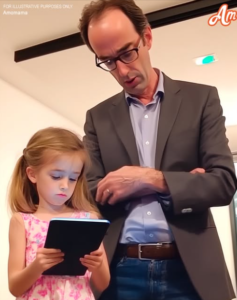Navigating post-divorce dynamics can be challenging, especially when new partners enter the picture. In this scenario, a mother faced a unique dilemma when her ex-husband demanded the return of a tablet he had gifted their daughter, influenced by his new wife’s sentiments. The mother agreed to return the tablet, but with a specific condition, highlighting the complexities of co-parenting and the boundaries set to protect her child’s well-being.
Background
After their divorce, the mother and her ex-husband maintained a civil relationship for the sake of their daughter, Emma. To support Emma’s educational needs, her father gifted her a tablet, which she used extensively for school projects and recreational activities. This arrangement functioned smoothly until the father’s remarriage to Lisa, a woman with whom he had an affair during his previous marriage.
The Demand
A few months into the new marriage, tensions arose. Lisa expressed discomfort with Emma having the tablet at her mother’s house, believing that gifts from her husband should remain in their household. Influenced by Lisa’s perspective, the ex-husband contacted the mother, insisting that the tablet be returned to his residence, asserting that it was intended for use at his home only.
The Mother’s Condition
Understanding the potential impact on Emma, the mother agreed to return the tablet under one condition: the father must provide a replacement tablet of similar quality for Emma to use at her primary residence. She emphasized that the device was essential for Emma’s educational continuity and that she should not be deprived of necessary resources due to adult disagreements.
Response and Resolution
The ex-husband initially resisted, citing financial constraints and accusing the mother of being unreasonable. However, the mother remained firm, highlighting that the request was solely to ensure Emma’s uninterrupted access to educational tools. After further discussion and recognizing the importance of Emma’s needs, the father agreed to the condition. He provided a new tablet for Emma at her mother’s residence, and the original device was returned to his home.
Analysis
This situation underscores several critical aspects of co-parenting:
- Child-Centric Decision Making: The mother’s insistence on securing a replacement tablet ensured that Emma’s educational needs remained a priority, demonstrating a commitment to her well-being over personal disputes.
- Setting Boundaries with New Partners: The influence of the father’s new wife introduced challenges. It’s essential for new partners to understand and respect established co-parenting arrangements to prevent unnecessary conflicts.
- Effective Communication: The resolution was achieved through open dialogue, where both parents expressed their concerns and reached a compromise that served their daughter’s best interests.
Conclusion
Co-parenting requires flexibility, clear communication, and an unwavering focus on the child’s needs. While new relationships can introduce complexities, maintaining boundaries and prioritizing the child’s well-being can lead to harmonious arrangements. In this case, the mother’s conditional agreement to return the tablet ensured that Emma’s educational resources remained intact, highlighting the importance of thoughtful and child-centered decision-making in post-divorce parenting.


